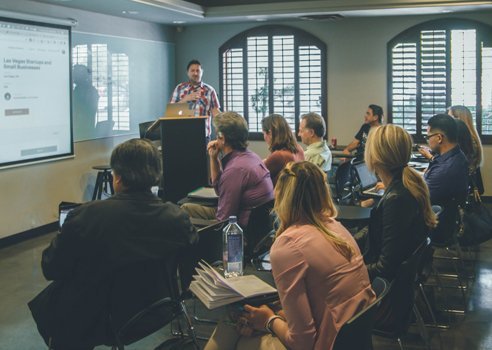Reading time: About 3 minutes
Have you ever considered any sort of continuing education for your own writing? It’s a great idea but you do need to consider a couple of issues first. Here are my tips. (Thanks to Miriam for the column idea.)
I signed up to take a no-cost teleseminar a few years ago. I no longer remember the topic or the names of the people leading it. But I remember, in excruciating detail, how much it irritated me.
The seminar was scheduled for 60 minutes and as soon as it started, I knew I was sunk. The call was rambling and unfocused — and conveyed nothing of substance. The two guys who hosted it gave each other lots of pats on the back (“You’re so smart, Mike.” “Thanks, Jason, you have some pretty sharp ideas yourself!”) But there was almost no information. Plain and simple, it was hucksterism.
Making matters worse, the one-hour call went more than 30 minutes overtime. (And you had to stay to the very end to be able to collect the “gift” that was the come-on for attending.) Determined to collect my gift, I tried to do other work while letting the call run in the background. But, at the 90-minute mark, I finally gave up.
Even worse, the emails started the very next day. Long, relentless and hype-y, they made me even madder. So after a week of this, I finally wrote one of the guys to say I wasn’t impressed with his teleseminar.
Whoa boy. That was like poking a stick in the eye of a muskrat. The animal became mad and snarly. “How dare you complain about a something you didn’t pay for,” he lectured me in a blistering email. I slunk away, put his address on my spam list and forgot about him til now.
So, should you totally dismiss the notion of educating yourself? Certainly not! I’ve done lots of no-cost education and stuff for which I’ve paid plenty — and most of it was very worthwhile. But you do need to be mindful. Here are five important tips when considering how to spend your money and your time. These tips apply not only to educating yourself in writing, but also for just about any other subject.
1) Watch out for hucksters. If something sounds too good to be true, it probably is. Caveat emptor. Whenever buying something, use the same level of skepticism you would when considering those Nigerian bank email scams. Better yet, get some personal referrals from people you trust. As well, know that events linked with blue-chip groups such as the International Association of Business Communicators (IABC) or the Public Relations Society (in Canada or the US) often have more legitimacy.
2) Look for legitimate escape hatches and ensure you can use them. Many Internet marketers offer a money-back guarantee if you’re unsatisfied. Just be sure you’ll be able to use it. I once took a course that was terrible but, I was unwilling to ask for my money back because I knew the host too well.
3) Find out what you can get without spending money. Many people offer some material at no charge. (Am I belabouring the obvious when I say you don’t pay for this newsletter?) Look at the stuff that doesn’t cost anything and consider: Is it worthwhile? Is it substantive? Is it helpful? If so, that person’s paid material is likely to be even better.
4) Ensure you have the time to implement the training offered. Most of us (and I include myself in this group) are greedy little suckers. We always want more for less. But stop and ask yourself: Can I really use this? Do I really need to learn how to do this? If the answer is yes, go for it. If not, go for something more relevant.
5) Don’t expect miracles. Of course, we all want to make a million dollars in month, work no more than four hours a week and lose 10 pounds in 10 minutes. But none of these things is terribly likely. I buy education the same way I buy cookbooks. If a $30 book has a couple of great recipes that will please my family for the next few months, then I’m happy. I never expect every recipe to work like a charm; that’s just unrealistic.
Whatever education you get, make sure it meshes with your overall goals. Then you won’t feel the need to poke a stick in anyone’s eye.


